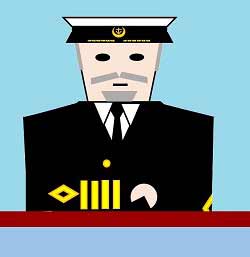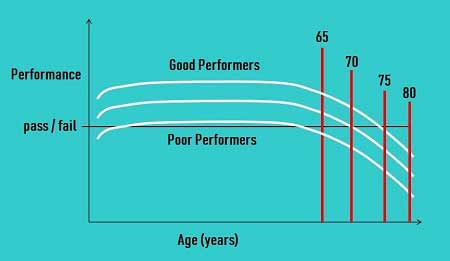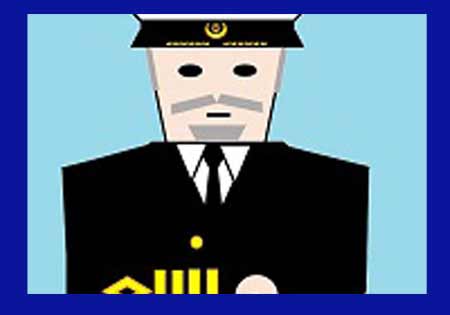“I may not be as strong as I think, but I know many tricks and I have resolution.”
- Ernest Hemingway, The Old Man and the Sea

The Captain on a ship if often called the ‘Old Man’. More often, the ‘grumpy old man’. I didn’t realize it then, but now as I have sailed into my early 40’s, I excuse my own grumpiness saying that there’s a physiological explanation for it.
But it’s not always about how cheerful you are. Today I want to touch on the sensitive topic of the effect of aging on job performance.
Ouch.
We all will get old one day or the other.
Yes, we will.
So, how do we lead ourselves and our teams as we grow older.
Getting old has its benefits. You have more experience, you gathered a great amount of knowledge, and people respect you just for your grey hair.
Aging after 40 also has its downside:
- The volume of the brain declines with age at a rate of around 5% per decade.
- Neurotransmitters such as dopamine decline by around 10% per decade and this has been associated with declines in cognitive and motor performance. Memory too declines gradually.
- Bone density decreases by about 1% every year.
- Peripheral vision narrows, near vision becomes less acute, eyes no longer focus as quickly, and night vision degrades.
- Cardiovascular disease is the major cause of maritime service disablement. Diet, exercise, smoking and stress management abilities are the lifestyle factors that influence the chances of a coronary incident putting an end to your career at sea.
- Muscle strength loss above the age of 50 occurs at around 15% per decade.
I can go on about each part of the body- but you get my drift. This should be taken seriously as working at sea requires keen psychomotor and cognitive skills, as well as executive functions such as monitoring inputs. What this means in terms of work is that an older navigator may miss observing the drift of the ship, or may lose track of multiple targets on the radar. The Chief Engineer’s daily inspection rounds from ‘tunnel to funnel’, especially on the modern megaships which are the equivalent of a 20-storey building, will progressively become difficult.
Take for example, the grounding of the Hong Kong ferry Xin Jie with 81 passengers onboard. The cause of the incident was due to sudden onset of dizziness of the 57 year old Assistant Master when he was steering. The Assistant Master had been suffering from hypertension and was taking Nifedipine twice daily to control the blood pressure. The drug has a side effect of causing dizziness which it did when he was having the con of the ship.
Or the 66 year old Master on the Maria M which ran aground on the Vanguard Shoals off Sweden. The investigaton report states that the Captain confused rudder position and turning rate and gave erratic orders which took the ship from a relatively safe position to the shallows. He was really a 'grumpy' old man who often called his bridge team 'idiots'.
The International Civil Aviation Organization (ICAO) is the aviation equivalent of the International Maritime Organization (IMO) and puts the upper age limit for single-pilot commercial air transport operations at 60 years. If they have a co-pilot, they can work until the age of 65. This is based on ICAO research of on-job performance evaluated on simulators and it rates this testing mechanism as better than medical checks.
For sake of comparison, the Maritime Labour Convention (MLC) and the International Convention on Standards of Training, Certification and Watchkeeping for Seafarers (STCW) adopt medical checks as the filter for service at sea, supplementing it with revalidation training every five years.

Good news is research confirms that you can look and be younger than the number of birthdays you’ve had. I’ve had the privilege of working with and observing some 65+ leaders way sharper than I could ever hope to be. But no two 50-year olds are alike; how well they perform depends on the various choices they make. To be able to get the benefits of experience back into the industry for as long as possible, leaders need to be conscious of this fact and make intentional choices to their lifestyle, and staying updated with technology in the workplace.
The sea is an unforgiving workplace. It does not care how old or experienced you are. There is no room for error. I’ve listed some strategies to lead yourself and your mind-body machine in my book Golden Stripes- Leadership on the High Seas. Some of these strategies are:
- Eat right, Fuel up.
- Sleep well, beat fatigue.
- Exercise: Become a Man of Steel.
- Stay Positive: Get your dose of Vitamin B+
- De-stress: Have a Relief Valve.
How are you preparing your mind and body for the evolving leader in you?
And if you’re in charge of managing both young and older professionals, develop goals, expectations and evaluation methods around the different skill sets each age group brings with them.
Now excuse me while I go get my fish-oil supplements for my memory. And then head to the gym.
- Try out this Biological Age Calculator
- Or this Online Health Check
Annual health checks are recommended if you’re over 40. Dental checks every 6 months regardless of age.
References:
- Thomas W. H. Ng & Daniel C. Feldman, The Relationship of Age to Ten Dimensions of Job Performance
- Dr Anthony Evans, Chief, Aviation Medicine Section, International Civil Aviation Organization, Montreal, Upper Age Limit for Pilots
- R. Peters, Ageing and the brain
- Karsten Keller and Martin Engelhardt, Age and strength loss
- Investigation report of the Xin Jie
- Investigation report of the Maria M


